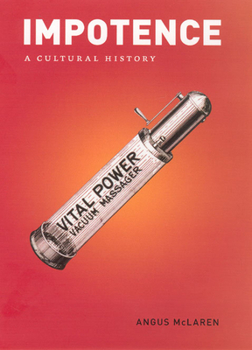Impotence: A Cultural History
As anyone who has watched television in recent years can attest, we live in the age of Viagra. From Bob Dole to Mike Ditka to late-night comedians, our culture has been engaged in one long, frank, and... This description may be from another edition of this product.
Format:Hardcover
Language:English
ISBN:0226500764
ISBN13:9780226500768
Release Date:April 2007
Publisher:University of Chicago Press
Length:350 Pages
Weight:0.45 lbs.
Dimensions:1.1" x 6.4" x 9.3"
Customer Reviews
1 rating
A Historical Review of a Longstanding Problem
Published by Thriftbooks.com User , 17 years ago
"Impotence in an age that believed in witchcraft was quite different from impotence in an age that believed in science." So writes Angus McLaren in _Impotence: A Cultural History_ (University of Chicago Press). What's even more important than the differences, however, is that all cultures have fretted about not having sufficient lead in their pencils. We have _the_ solution now, a wonderful pill, although like all the others, it is a solution linked with its own problems. McLaren's extensive history may be about impotence, but winds up being a history of all sorts of sexual ideas, like understanding of conception, superstitions about masturbation, women's emancipation, and more. This is literally a vital topic, and in some ways it is dismaying that we have a long history of surrounding it with silly and illogical worries. That merely shows, however, that the subject is an important one, and McLaren's entertaining book puts it into proper historical perspective. Everything always seems to start with the ancient Greeks, who started the long tradition of blaming someone else for the problem. A Roman man would fret if neither women nor boys prompted an erection, and not having an erection, not being able to penetrate, was a shame in itself. It had nothing to do with failing to please a partner, for a desire to please a partner was itself felt to be effeminate. The medieval church felt that a marriage was only a marriage if it were properly consummated, and as a result, there was the irony of nominally celibate churchmen having to debate and adjudicate the finer points of coitus. If a wife or her family claimed that a husband had not fulfilled his part of the bargain, he might have to show that he had the power to do so. Sometimes prostitutes would be hired so that the clerics might witness the resultant erection. The performance anxiety must have led to many false positives. The problem has always been perceived as a real one, and so solutions were always there to be tried, even if they were not real solutions. Impotence then as now has been a boon for quacks. In the 1700s Dr. Brodum offered his Nervous Cordial and Botanical Syrup to get men ready for the rigors of the married state. Victorian doctors tried to cure the ailment, but they had little to offer to distinguish themselves from the quacks. They had advice on morals; don't have sex too often, and for goodness sake, don't masturbate. It would be nice to think that the twentieth century and its scientific and sexual revolutions would have solved things, but such is not the case. There were nutty therapies involving the implantation of goat or monkey glands. Viagra (and the subsequent Cialis and Levitra) were supposed to take all the worry out of sex, but nothing performs that function. McLaren reports that female partners of Viagra users aren't nearly as convinced that the drug is a boon as those who swallow the pills are, and anyway, only half of the men who try it ever





